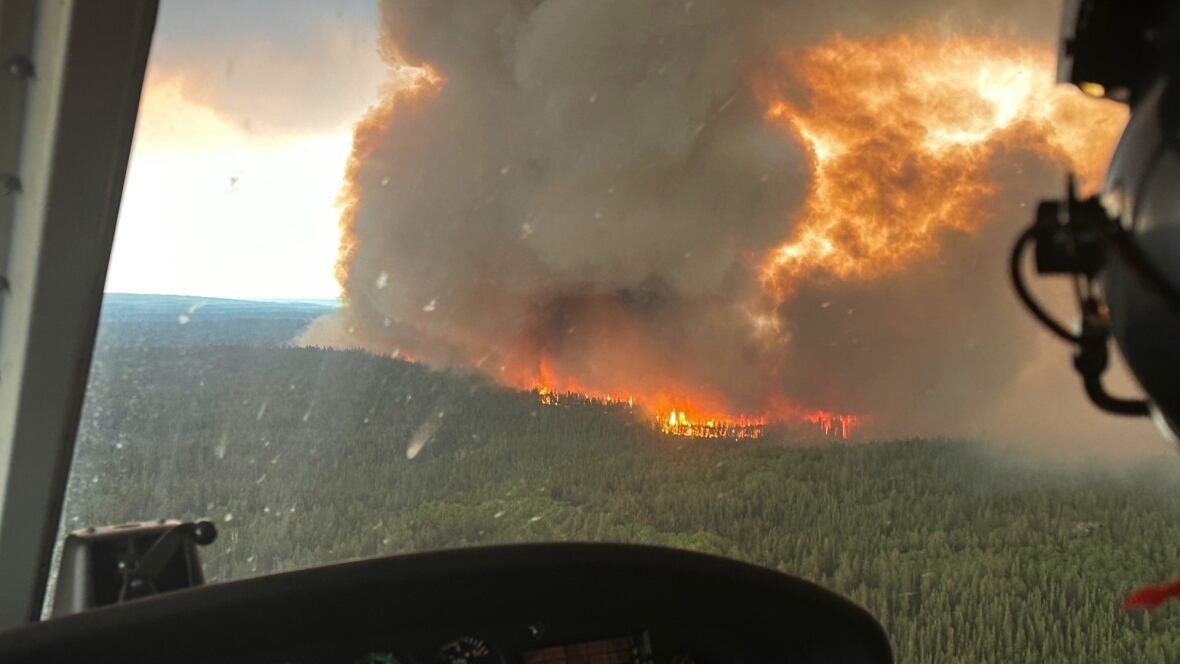Wildfires in western Canada, particularly in the provinces of Manitoba and Saskatchewan, have escalated rapidly, forcing mass evacuations and prompting both provinces to declare states of emergency.
The fires, fueled by hot, dry, and windy weather conditions, are posing serious threats to communities and straining emergency resources, according to BBC on Saturday, May 31, 2025.
More than 180 active wildfires have been reported across Canada, with many deemed out of control.
In Manitoba, a particularly urgent situation is unfolding in the northern First Nations community of Pukatawagan.
The province, with assistance from the Canadian Armed Forces, the Manitoba Wildfire Service, and the Heavy Urban Search and Rescue Team, has been deploying military aircraft and helicopters to evacuate residents.
As of Friday, over 2,000 people still needed to be airlifted out of the area.
Officials described the evacuation as a “rapidly evolving situation.”
The city of Flin Flon, home to about 5,000 residents, has been almost entirely emptied.
According to reports, only emergency personnel such as firefighters and support workers remaining.
Manitoba currently has 25 active wildfires, 10 of which are considered out of control.
The severity of the fires has led the provincial government to call for international assistance in containing the blazes and protecting residents.
Saskatchewan is also battling severe wildfire conditions.
As of Saturday, the province was dealing with 16 active fires, seven of which were uncontained.
The Canadian Interagency Forest Fire Centre has classified wildfire risk in Saskatchewan as “extreme.”
Evacuation orders have been issued in parts of Alberta and British Columbia as well, as fire conditions worsen across the region.
Meteorologists warn that the weather will not be favorable for firefighting efforts in the days ahead.
Danielle Desjardins, stated that while a cold front is expected to arrive in parts of Saskatchewan, it is unlikely to impact the fire zones.
Desjardins is a meteorologist with Environment and Climate Change Canada based in Winnipeg,
More concerning is that the front will bring strong winds.
This will combine with the heat and lack of rain, create ideal conditions for wildfires to spread further.
The smoke from these fires is not only affecting Canadians but also drifting into the United States.
An estimated 22 million Americans are under air quality advisories due to the haze.
States such as Michigan and Wisconsin have issued warnings.
On the other hand, in northern Minnesota, residents have been advised that air quality may reach levels considered “unhealthy for everyone.”
The rest of the state remains under warnings for sensitive groups, with the alert extended through Monday evening.
Canada is still reeling from its worst wildfire season on record in 2023, when more than 42 million acres of land burned.
While wildfires are a natural occurrence in Canada, climate experts warn that climate change is increasing the frequency, duration, and intensity of such events.
Rising temperatures, prolonged dry spells, and stronger winds are all contributing factors.
The UN’s climate agency has confirmed that extreme heat accelerates moisture loss from soil and vegetation, making the landscape more flammable.
In response to the growing crisis, Manitoba and Saskatchewan are seeking external support.
Emergency shelters have been established for evacuees.
Also, organizations like the Canadian Red Cross are helping provide necessities and temporary housing.
In some communities, hockey arenas have been repurposed as evacuation centers.
The federal government has pledged additional resources, including equipment and personnel to aid in firefighting and evacuation efforts.
The Canadian Armed Forces are playing a key role in managing logistics and transport, especially for remote communities cut off by the fires.
Despite the massive response efforts, officials warn that the wildfire threat is far from over.
Forecasts predict continued hot and dry conditions, meaning that fire crews will be battling the blazes for days or possibly weeks to come.
As Canada braces for what could be another record-breaking fire season, officials stress the importance of addressing the long-term impacts of climate change.
They also emphasize the need for investing in disaster preparedness to better protect communities across the country.







